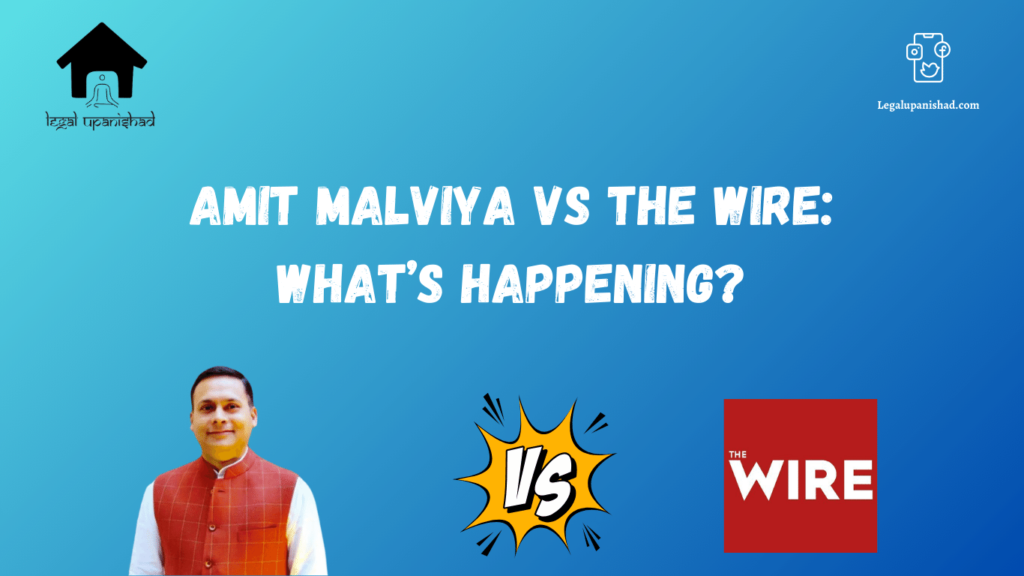This article on ‘Amit Malviya vs. The Wire: What’s Happening?’ was written by Shashanki Kaushik, an intern at Legal Upanishad.
Introduction
The news website ‘The Wire’ was sued in October 2022 by Amit Malviya, the head of the Bharatiya Janata Party’s IT department, who claimed that it had used “forged documents with a view to malign and tarnish” his reputation.
The Wire had published a series of articles alleging that Meta, the parent company of social media giants Facebook and Instagram, had granted Malviya special privileges that allowed him to have posts removed from their platforms. The reports were based on a fabricated Instagram incident report, according to Meta.
The Wire subsequently retracted the articles and apologized to Malviya. However, Malviya has maintained that the damage has already been done and that he intends to pursue legal action against the news website. This article attempts to analyse the facts, laws, and judgement of the given case between The Wire and Amit Malviya.


Facts of the case
In October 2022, The Wire published a series of articles alleging that Meta, the parent company of Instagram, had granted Amit Malviya, the IT cell head of the Bharatiya Janata Party (BJP), special privileges that enabled him to take down posts he objected to. The articles were based on a purported Instagram incident report that Meta said was fabricated.
Malviya filed a criminal defamation case against ‘The Wire’ and its journalists, alleging that they had deliberately published false and defamatory information about him with the intent to malign and tarnish his reputation.
Laws Involved
The law involved in this case is Section 499 of the Indian Penal Code, which deals with the offense of defamation. When someone publishes or makes an incorrect statement, accusation, or false imputation about another person, whether through visual cues, oral communication, words, or any other means, Section 499 of the IPC states the following:
“Whoever, by words either spoken or intended to be read, by signs, by visible representations, makes or publishes any imputation concerning any person intending to harm, knowing or having reason to believe that such imputation will harm the reputation of such person, is said, except in the cases hereinafter excepted, to defame that person.”
The legal issues involved in the Amit Malviya vs. The Wire case include defamation, criminal conspiracy, forgery, and cheating.
Judgements
The case is still pending before the Delhi High Court. However, in October 2022, the court granted Malviya interim relief, directing The Wire to take down the articles and refrain from publishing any further defamatory content about him.
Conclusion/ Analysis
This case raises a number of important issues related to the freedom of the press, the right to reputation, and the need to combat fake news. On the one hand, journalists have a right to report on matters of public interest, even if those matters involve criticism of public figures. However, this right is not absolute. Journalists must ensure that their reporting is accurate and fair, and they must not publish false or defamatory information with the intent to harm someone’s reputation.
On the other hand, public figures also have a right to protect their reputations. If someone publishes false or defamatory information about a public figure, that person may be able to sue for defamation. In this case, Malviya has alleged that ‘The Wire’ deliberately, with the intention of tarnishing and maligning his reputation, published false and defamatory information about him. If Malviya is able to prove this allegation, he may be successful in his defamation case.
However, even if The Wire is found to have published false information, it may be able to defend itself on the grounds that it was acting in the public interest. The Wire has argued that its articles were based on a purported Instagram incident report that it received from a source. If The Wire can show that it reasonably believed that the report was genuine, it may be able to avoid liability for defamation. Ultimately, the outcome of this case will depend on the facts and the law. However, the case raises important questions about the balance between the freedom of the press and the right to reputation.
The case of Amit Malviya vs. The Wire is still pending before the Delhi High Court. However, the case has already raised important questions about the freedom of the press, the right to reputation, and the need to combat fake news. The outcome of this case will be closely watched by journalists, public figures, and the legal community.
List of References
- The Indian Penal Code, 1860 (Act 45 of 1860), s 499
- Prashant Jha, ‘Amit Malviya vs. The Wire: Delhi court orders Police to release electronic devices seized from The Wire’s editors, journalists’, bar and bench, 24 September 2023, available at: https://www.barandbench.com/news/amit-malviya-the-wire-delhi-court-delhi-police-release-electronic-devices-seized-editors-journalists
- ‘Explained: BJP’s Amit Malviya vs ‘The Wire’ and the role of Meta’, FirstPost, 28 October 2022, available at: https://www.firstpost.com/explainers/explained-why-bjp-amit-malviya-is-suing-the-wire-meta-stories-instagram-11526641.html

